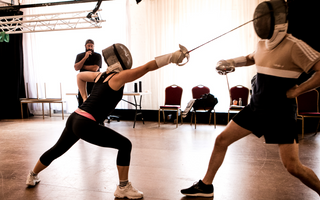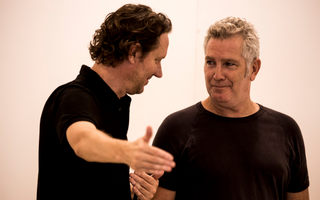 On Stage
On Stage
Antithesis is one of Shakespeare’s favourite dramatic devices. It refers to the use of words or phrases that are the opposite of each other. Antithesis is the key to understanding Hamlet and his struggle in this play.
Shakespeare presents opposites or contradictions by balancing opposing words and statements in a sentence, by building strongly contrasting images in the audience’s mind, and by establishing characters and situations that directly oppose each other.
Consider the following:
- Fortinbras’ and Laertes’ actions of revenge are the antithesis of Hamlet’s inaction.
- Old King Hamlet in contrast to Claudius.
- The honesty of Hamlet’s grief over his father’s death contrasts with the fake grief of the court.
- Death for Hamlet is both "a consummation devoutly to be wish’d" (Act 3, Scene 1)and a place of "dread".
- His distrust of women produces an antithetical argument, that "beauty will sooner transform honesty from what it is to a bawd, than honesty can transform beauty into his likeness." (Act 3, Scene 1)
- His mother’s marriage vows are "false as dicer’s oaths" (Act 3, Scene 4)
Antithesis is the device in the play to create conflict and drive the action of the plot. Elsinore should be a civil world, but it is filled with horror. It is little wonder that Hamlet’s fundamental question –To be or not to be – is one of antithesis and that the only solution he can find is also one of antithesis – I must be cruel only to be kind.
Read through the following passages:
- Act 1, Scene 2 – Claudius’ speech to court (1-16) and his speech to Hamlet (87-117)
- Hamlet’s first soliloquy (Act 1. Scene 2: 129-158)
- Polonius can barely speak without revelling in antithesis, a clue to us that he sees the world in black and white, rather than in complex, human terms. Examine his scene with the King and Queen (Act 2. Scene 2: 85-165)
- Ophelia’s speech (Act 3. Scene 1: 144-155)
In each excerpt highlight the words and phrases used to create antithesis.
EXTENSION ACTIVITY:
What would be the effect if you re-wrote these words or phrases using the opposite first. For example: I must be kind to be cruel.











